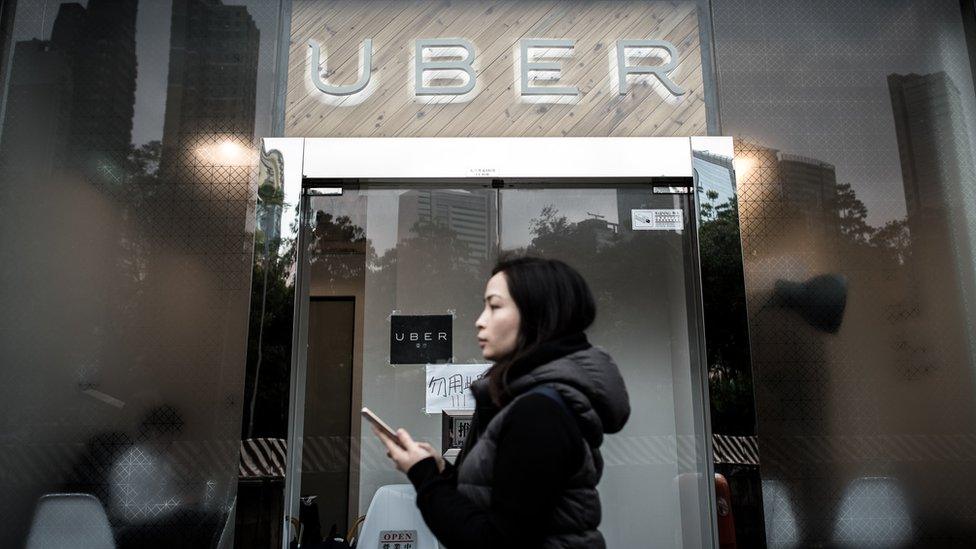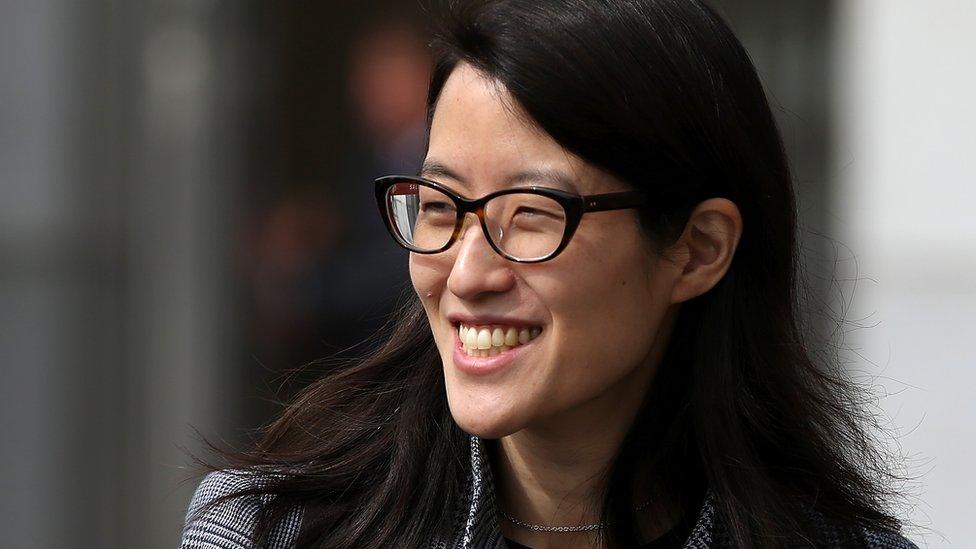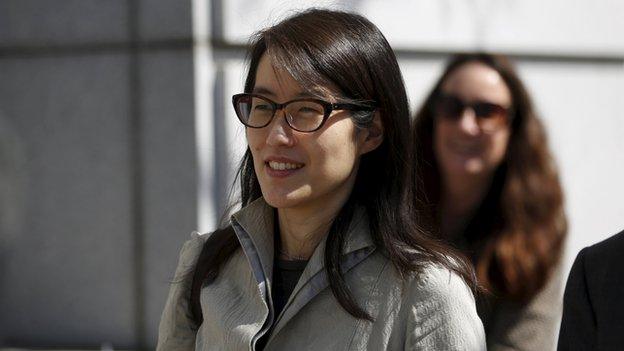Does Silicon Valley have a sexism problem?
- Published

Uber has found itself in the spotlight over a high-profile and public sexual harassment claim
Taxi-hailing app Uber has promised an "urgent investigation" into claims of workplace sexual harassment, after a female engineer said misogyny was rife at the firm and women were quitting in droves.
Susan Fowler, a software engineer, wrote a blog post about a "very, very strange year at Uber".
In it, she says her manager tried to have sex with her on her first official day at work, sending her messages about his open relationship.
It's just the latest blow for a company that has gained a reputation as a bastion of Silicon Valley's macho "bro" culture.
But is Uber really any more sexist than other tech giants in the Valley?
'Impacted my job'
Ms Fowler's claims have resonated with many women in the tech world, and surveys suggest her experiences are not uncommon.
According to a 2016 survey, 60% of women working in Silicon Valley experience unwanted sexual advances.
The "Elephant in the Valley, external" survey found that 87% of the 220 women interviewed had witnessed demeaning comments from their colleagues.
Almost 40% of those who said they were harassed at work did not report the situation, fearing it would damage their careers.
"I was propositioned by a hiring manager early in my career when I was a job candidate," one contributor to the study wrote.
"He clearly indicated that if I slept with him, he would make sure I was promoted as his 'second in command' as he moved up the ladder in the company."

Former Reddit CEO Ellen Pao tweeted a message of support after Ms Fowler's story was published
Another said she had turned down her CEO's sexual advances the first time they travelled together for work.
"After that, I was never asked to travel with him again," she said. "This impacted my ability to do my job."
The study followed a high-profile gender discrimination lawsuit in 2015 from former Reddit CEO Ellen Pao - one of those praising Ms Fowler's stand against Uber.
On Twitter, Ms Pao said, external Ms Fowler's blog post shows "the state of tech in one woman's story, also the story of many women, many people at many companies".

See also:

Discrimination is difficult to quantify - especially when victims are unwilling to speak out.
Yet on top of Ms Pao's case, there have been several high-profile lawsuits and sudden exits in the tech world in recent years:
In 2014, former Tinder executive Whitney Wolfe sued the dating app, claiming she was called a "slut" and a "whore" by Tinder marketing chief Justin Mateen, and denied her rightful title of co-founder because she was a woman. She received a settlement worth $1m (£800,000)

Whitney Wolfe, former Tinder executive, claimed she was harassed at the company - but went on to found competitor Bumble
Tom Preston-Werner, founder of the social coding site GitHub, resigned in 2014 after a sexual harassment investigation. No legal wrongdoing was found, but the company said there had been "evidence of mistakes and errors of judgement"
Kelly Ellis, a software engineer at Google for more than four years, levelled shocking allegations of harassment against the company on Twitter in 2015, saying senior colleagues had made unprofessional comments about her appearance. These allegedly included one superior telling her during a company trip to Maui that it was "taking all of [his] self control not to grab" her
How does tech compare to other industries?
Comparing results from different studies with different questions can be problematic - but there are some hints that Silicon Valley has a problem.
Statistics on sexual harassment vary widely, but an extensive 1992 US national study found that 41% of women had experienced it; and about 40-50% of women in the EU, according to the United Nations.
Both estimates are still lower than the Silicon Valley survey's 60%.
The 2016 Women in the Workplace study - a major US national survey - found that 19% of the technology sector's top executives are women - broadly in line with sectors like banking, media, or professional services.
The same study found that, across all industries, 30% of women who negotiated for a promotion or a better salary were told they were "bossy", "aggressive" or "intimidating".
In the Elephant in the Valley survey, that rocketed to 84% of women being told they were aggressive (though that question was not specifically about negotiation).
What's being done for gender balance?
The world's biggest tech companies know they're dominated by white men, and many are funding schemes to address that.
In its annual diversity and inclusion report, Apple said it had closed pay gaps over the past year by analysing salaries, bonuses and stock grants.
Facebook has pledged to give $15m (£12m) to Code.org, a non-profit group teaching young women and underrepresented minorities how to write computer code.
And in 2015, Google told USA Today it would invest $150m (£120m) in workforce diversity initiatives that year, up from $115m in 2014.
At the moment, 23% of Apple's tech employees are women. At Google, it's 19%. And at Facebook, just 17%.
Change comes slowly in companies of this size, so the path could be a long one.
But by broadening the pool of people qualified to work there, Silicon Valley is hoping to change the status quo.
- Published20 February 2017
- Published24 April 2015

- Published28 March 2015
